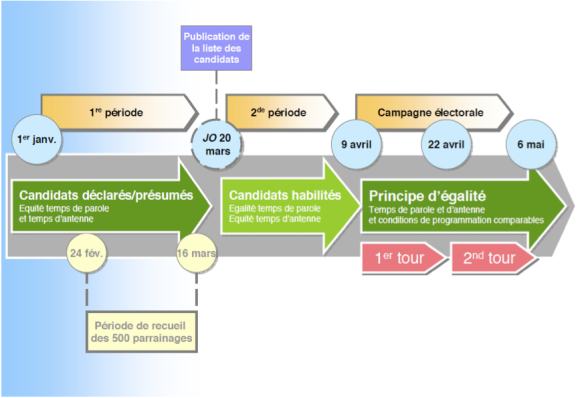Ten. That’s the number of candidates running for the French presidency, and the problem of finding a way for all of them to debate together may find a solution online.
A televised debate on France 2 show “Mots Croisés” will take place on the 16th of April, but organizing it is harder said than done. François Bayrou insists it is public broadcasting’s role to do so, and smaller candidates like Jacques Cheminade and Nathalie Arthaud said they would come. But Nicolas Sarkozy’s campaign only wants a second round debate, François Hollande is still hesitating and Marine Le Pen will come…only if the latter two do.
For an American audience this may be difficult to understand. Didn’t the Republican primaries host a multitude of debates with eight candidates? There are important differences that make it hard to repeat the experience here. All the primary candidates were, by definition, Republicans or conservatives, which meant that despite differences between individual candidates, most of them had the same thinking framework. The French presidential election couldn’t be more different (although, amusingly enough, both Newt Gingrich and Jacques Cheminade share a passion for space travel). The ten candidates span the whole political spectrum, from extreme-right to extreme-left, and getting them to debate in a constructive and clear way is an arduous task.
Then why not forget the smaller candidates that are barely polling in single digits and focus on the main four or five? asks my fictional American audience. In France, CSA regulations (see my previous post for an explanation) make this impossible. All candidates need equal airtime, and favoring candidates is not an option.
This is where the web kicks in. CSA regulations don’t apply to the Internet, so organizing such a debate is legal. It would also allow for a much more flexible organization. These past few days Dailymotion, the Parisien.fr, Europe 1.fr, Yahoo! and the Nouvel Observateur.com have joined forces to do just that. In a common statement they wrote:
“In the face of the innumerable difficulties the traditional media are encountering in trying to organize a debate between the main presidential candidates, and to fulfill the voters’ need for information, Dailymotion, Le Lab Europe 1, Yahoo!, Le Nouvel Observateur.com and LeParisien.fr are joining forces to propose a real debate. […]”
They added that the candidates:
“will be able to challenge each other, exchange and debate without constraints, and will be interviewed by young, experimented and talented journalists as well as by web users via social media.”
The Twitter hashtag #ledébat is the rallying point for these web media, who have started contacting candidates on social media, as you can see below:
Marine Le Pen, Nicolas Dupont Aignan and François Bayrou have already accepted. But while an unrestricted online debate is in the interest of the smaller candidates (as is the televised one, where they get airtime equal to that of their opponents), heavyweights Nicolas Sarkozy and François Hollande are much more reluctant to jump into a ten-man arena. Both already have the second round in sight, and their campaigns don’t want to get bogged down in such an event, online or off.


